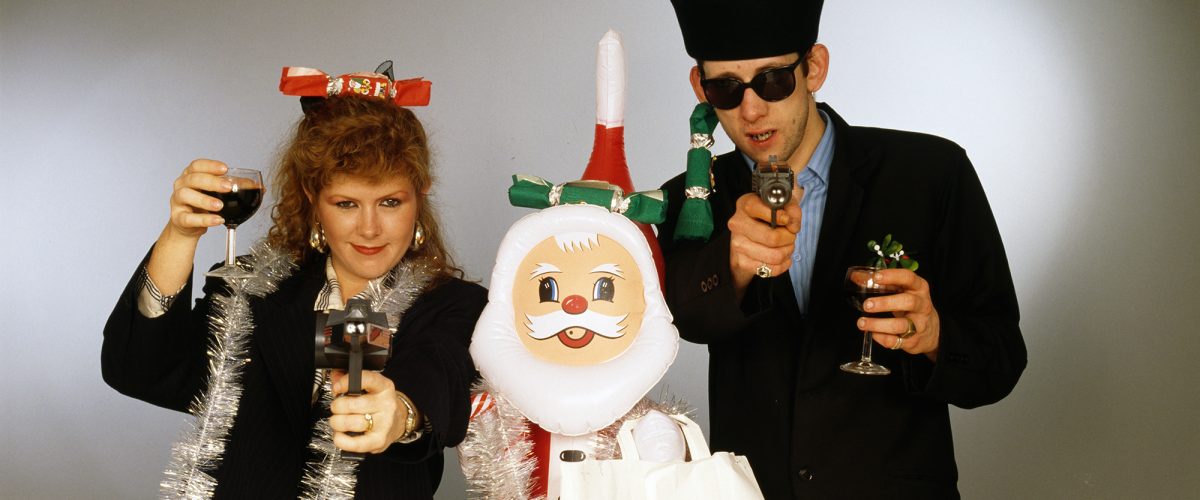Sitting on the floor Christmas morning in my bright red Union suit, I brace myself for the forthcoming onslaught of ripped wrapping paper at the hands of two small children. The kids already have found Santa’s presents resting beside the fireplace. Cries of ecstasy with arms raised to the heavens display the newly acquired toy they couldn’t possibly live without.
It’s a scene opposite of the biblical wailing and gnashing of teeth. Cheer and childlike wonder fill the room like smoke rising in a chimney. If one more Santa-infused spark occurs, I’m afraid my children will spontaneously combust out of pure joy.

Justin Cox
During the fray, my spouse and I take the time to exchange our own gifts and sort through stockings. The kids eventually move on to the boxes and bags from grandparents, aunts and uncles. An elfin present from my sister, who lives back in my home state of North Carolina, finds its way into my hands. I tear open the packaging to find a black shirt with a light silhouette of a man with a ponytail playing a saxophone. Under the graphic in bold letters, it says, “I Still Believe.”
My sister and I get each other the way two people growing up in the same house only can. The shirt is in reference to one of our favorite 1980s cult classic horror movies. The outlined figure is a man by the name of Tim Capello. A talented musician whose career saw him support acts like those of Tina Turner, he also made a brief cameo in the movie we both enjoy, a scene in which he belts out the lyrics, “I still believe!” before riffing on his sax.
The expression “I still believe” is appropriate, dare I be so bold to say prophetic, for the Christmas season (and yes, I’m referring to the 12 days after December 25). As a Baptist, I’m always looking for something or someone to confess anew or bless out. Seeking a space where all mortal flesh is silent so I might collect my thoughts, I slip out of the living room to grab a second cup of coffee. Mid-pour, I start imagining the people, traditions and those fragile small “t” truths I still declare to believe in.
“Witnessing what I am this morning, … I still believe the spirit of Christmas is alive and well.”
Witnessing what I am this morning, watching my children’s faces light up like the exterior of Clark Griswold’s home, I still believe the spirit of Christmas is alive and well.
With my sister’s gift in hand, I still believe The Lost Boys is the greatest vampire movie ever made.
And reaching for a treat on the counter, I still believe cookies consumed in the name of Saint Nicholas of Myra hold neither calories nor shame.
Our kitchen is a space filled with as much music as smells, and so this morning, while still compiling a list in my head, I queued up a playlist of choice tunes. Immediately, a gentle piano intro fills my ears and reminds me why I still believe the Pogues and their front man Shane MacGowan’s “Fairy Tale of New York” is the greatest Christmas song/hymn ever written — sacred or otherwise.
MacGowan and his music have been on my mind since his passing almost a month ago. In some regards, his end seemed long overdue for a man who appeared to squeeze every last drop out of life through a series of famous escapades and debauchery-driven shenanigans. Yet, like Rolling Stones guitarist Keith Richards, MacGowan appeared to possess a slippery spirit death never could get a firm bone-clutching grip on. A life filled with too many late nights, mixed with too many intoxicating indulgences, seemed to grant him a level of immunity — for a time at least.
Born under a rebellious star on Christmas Day 1957, MacGowan is believed to be the lord and savior of Irish folk music. During the 1980s and 1990s, he merged the genre with the confrontational counter-cultural message of the punk scene, bringing generations of nonconforming listeners together. Such a feat earned him praise in his beloved Tipperary and worldwide. His unabashed pride for his people, their history and his songwriting ability secured an endearment still rippling 30 years later well beyond the coasts of the Emerald Isle.
“A crooner he was not — his style more of troubled troubadour.”
MacGowan’s lyrics, voice and delivery were filled with imperfections and grit. A crooner he was not — his style more of troubled troubadour. Simplistic, beautiful and never boring. Listening to him belt out “A Pair of Brown Eyes,” “Dirty Old Town” and “The Old Main Drag” is a cure for the overconsumption of the inadequate.
Arguably, the Pouges’ most successful commercial single, “Fairy Tale of New York,” is a Shakespearean tragedy set to the distinct sounds of tin whistle and accordion. The song is a back-and-forth between MacGowan and the late Kirsty MacColl, who provided the other half of the vocals. The duet retraces a couple’s passionate beginnings in the Big Apple and ensuing troubles that leave them on hard times. The song opens with MacGowan behind bars in a New York City drunk tank, surrounded by other characters who, like himself, have cast off the last remnants of anything resembling refinement.
It was Christmas Eve, babe
In the drunk tank
An old man said to me, won’t see another one
And then he sang a song
The Rare Old Mountain Dew
I turned my face away
And dreamed about you
The story goes on to describe the fragileness of a couple who are interdependent on one another. They experience extreme highs but slowly begin amassing a banquet of bitterness incapable of being patched up. In their way, they appear to love to the detriment of self. This isn’t your light-hearted “All I Want for Christmas” jingle. This story has real issues, feelings and lives at stake. The vulnerability of it all moves me more than Mariah Carey’s offering ever could.
As the couple regretfully recalls how they’ve grown apart, MacGowan unleashes, “I could have been someone.” To which MacColl quips back:
Well so could anyone
You took my dreams from me
When I first found you
What comes next is where I get all choked up in the feels. MacGowan comes back with:
I kept them with me babe
I put them with my own
Can’t make it all alone
I’ve built my dreams around you
The cynic, the Ebenezer Scrooge in me, wants to say this is just a parting shot. An attempt at having the last word and shaming a scorned lover. However, the hopeful romantic in me coaxed out of hiding every Christmas season wants to believe the words are heartfelt. Sure, what this duo is singing about is awful. They are next to empty, emotionally trapped by one another, no longer the persons they used to be before their paths crossed. Hell, I’m not above calling their relationship manipulative and toxic.
The song could end there, the two going separate ways, but it doesn’t. A final chorus promises a small but hopeful outcome.
The boys of the NYPD choir
Still singing Galway Bay
And the bells are ringing out
For Christmas day
“Galway Bay,” a song about returning to Ireland, references a chance to go back to what was good and pure. A fresh start. Restoring the magic of what made their young love special. A fleeting, imperfect but genuine adoration of each other.
Call the dark times Christmas Eve in a drunk tank.
Call them a dark night of the soul.
The point is Christmas Day is coming, the bells will ring out and everyone, no matter their previous night or life’s circumstances, gets a chance through sheer volition to start again.
If that’s not a hopeful message worthy of being spread to shepherds in their fields, sought after by wise men and extended to prisoners in their cells, I don’t know what is.
Call it what you will, but it’s the kind of song I like to listen to this time of year.
One with the type of Christmas message I still believe in.
Justin Cox received his theological education from Campbell University and Wake Forest University School of Divinity. He is an ordained minister affiliated with the Cooperative Baptist Fellowship and enrolled in the doctor of ministry program at McAfee School of Theology. When not spending time with his spouse and daughters, he can be found writing and baking late into the night. He currently resides in New England with his family. His thoughts and reflections are his own.


